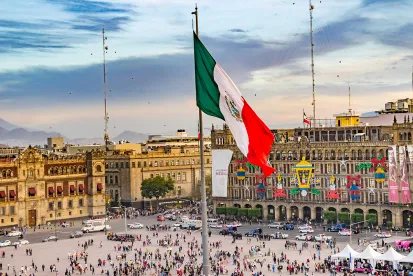Workers at a General Motors Co. (GM) plant in Mexico have voted in favor of union representation. The vote was made possible by Mexico’s new labor law, which was enacted as a result of the United States-Mexico-Canada Agreement (USMCA).
This unprecedented vote sets up one of the first collective bargaining agreement (CBA) negotiations under Mexico’s reformed labor law. The negotiations likely will test Mexico’s new labor law and have significant ramifications for U.S. employers and suppliers who do business or rely on the supply chain in Mexico.
Background
In May 2019, as required by the USMCA, Mexico enacted a labor reform bill that substantially overhauled Mexico’s labor law. Under Mexico’s new labor law, which is similar to the United States’ National Labor Relations Act, workers in Mexico are afforded greater protections and rights, including elections of unions by secret ballot, transparent negotiation and CBA approval, an independent labor adjustment board or court, and democratic election of union officers.
Prior to ratification of the USMCA and passage of Mexico’s labor reform bill, a company in Mexico could recognize a union and sign a contract with that union without any input or approval from workers. These agreements, referred to as “Protection Agreements,” often set employer-friendly contract terms and were sometimes signed before the company had hired workers at its worksite. With limited accountability, transparency, and no democratic elections, most unions in Mexico accommodated the needs of the companies. Many U.S. companies operating in Mexico were signatory to Protection Agreements.
Mexico’s new labor law requires democratic unions and overhauls the investigation and enforcement of Mexico’s labor laws. Under the new law, a union in Mexico may be recognized as the exclusive bargaining representative with just 30 percent of employee support. However, ratification of a CBA requires majority support of all represented workers. The aim of the majority support requirement is the eradication of Protection Agreements. Mexico’s new law also requires the establishment of independent unions and sets up new administrative courts and agencies to enforce the law. The Federal Center of Conciliation and Labor Registry oversees union elections and contract ratification, and new state and federal labor courts that are part of Mexico’s judiciary branch will resolve disputes.
Workers Voted to Unionize
On February 3, 2022, more than 5,000 of the roughly 6,000 workers at GM’s plant in Silao, Guanajuato, Mexico casted secret ballots and voted overwhelmingly in favor of representation by a new independent and democratic union, the Independent National Autoworkers Union (SINTTIA). The election was monitored closely by representatives of Mexico’s Federal Center of Conciliation and Labor Registry. No unlawful conduct or irregularities prior to or during the election has been reported. GM called the vote an unprecedented exercise in democracy and said it is ready to work with SINTTIA representatives, including to negotiate a new CBA.
Workers at GM’s central Mexico plant previously were represented by the Confederation of Mexican Workers (CTM), one of the largest and most powerful old-guard unions in Mexico. CTM and GM were also parties to a Protection Agreement. In May 2021, after the labor reform bill was enacted, CTM organized an election in which workers voted on whether to approve the Protection Agreement. Following complaints of serious violations of workers’ rights by CTM, the U.S. Trade Representative’s office initiated a review of the May 2021 election using the Rapid Response Labor Mechanism — the USMCA’s dispute settlement enforcement tool. The Mexican government then agreed to hold a new election. During the August 2021 re-run election, workers voted out CTM. The vote to remove CTM also resulted in the termination of the Protection Agreement.
The GM workers’ rejection of the Protection Agreement and decision to be represented by SINTTIA were important tests of the USMCA, Mexico’s new labor law, and the Mexican government’s commitment to labor reform. The successful votes, however, are just the beginning of what promises to be greater union organizing efforts, labor relations challenges between employers and unions in Mexico, and increased oversight by the U.S. government and U.S. labor organizations.
Next
While GM’s workers have successfully reorganized, GM and SINTTIA still must negotiate over a new CBA. The negotiation and ratification process could take months, if not years, to complete. Any disputes that arise during negotiations likely will test the dispute resolution and enforcement mechanisms of the USMCA and Mexico’s new labor law, including the new state and federal labor courts’ ability to efficiently and impartially adjudicate disputes.
The precedent-setting election, future elections that other manufacturers in Mexico will face, and upcoming CBA negotiations between independent Mexican unions and manufacturers will influence future union organizing efforts and labor law enforcement efforts in Mexico for years to come. U.S. manufacturers and suppliers operating in Mexico, those seeking to expand operations in Mexico, and those that rely on the Mexican supply chain will need to review their strategies.






 />i
/>i

